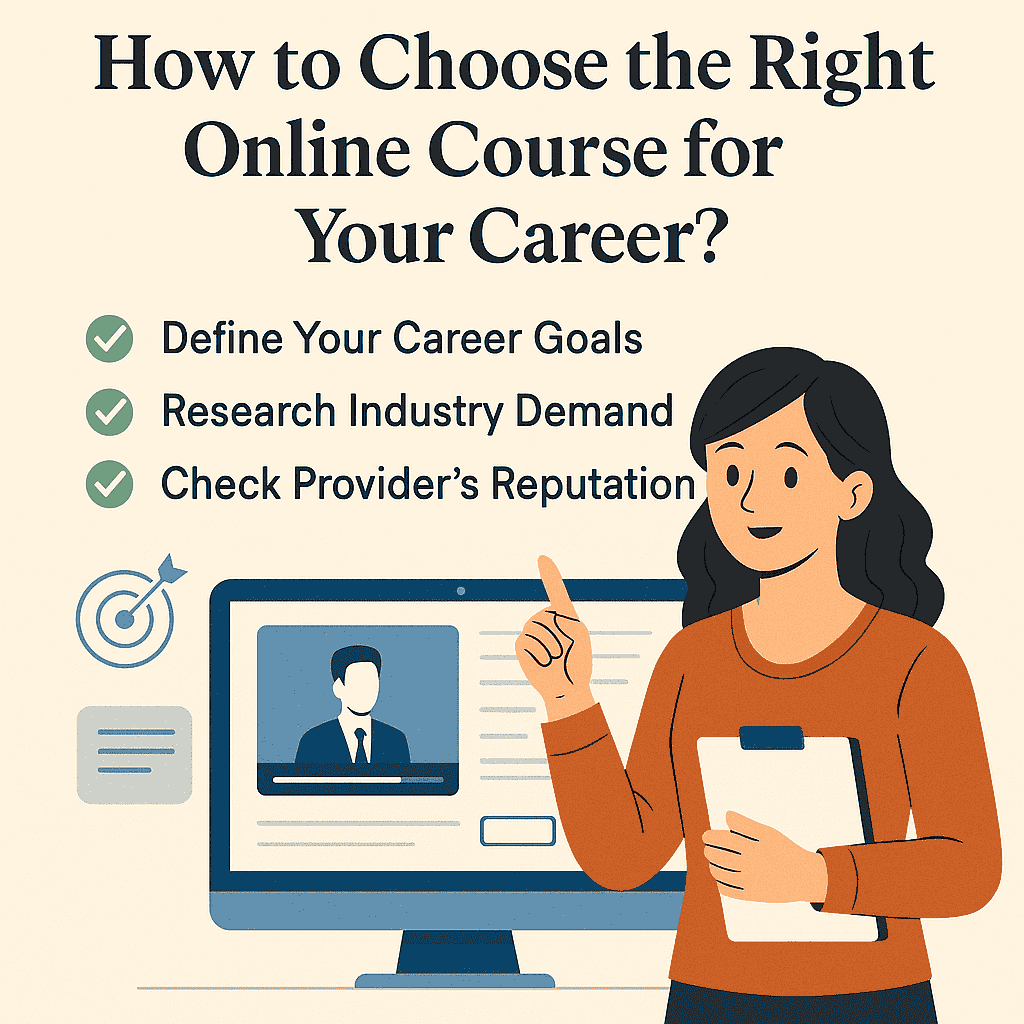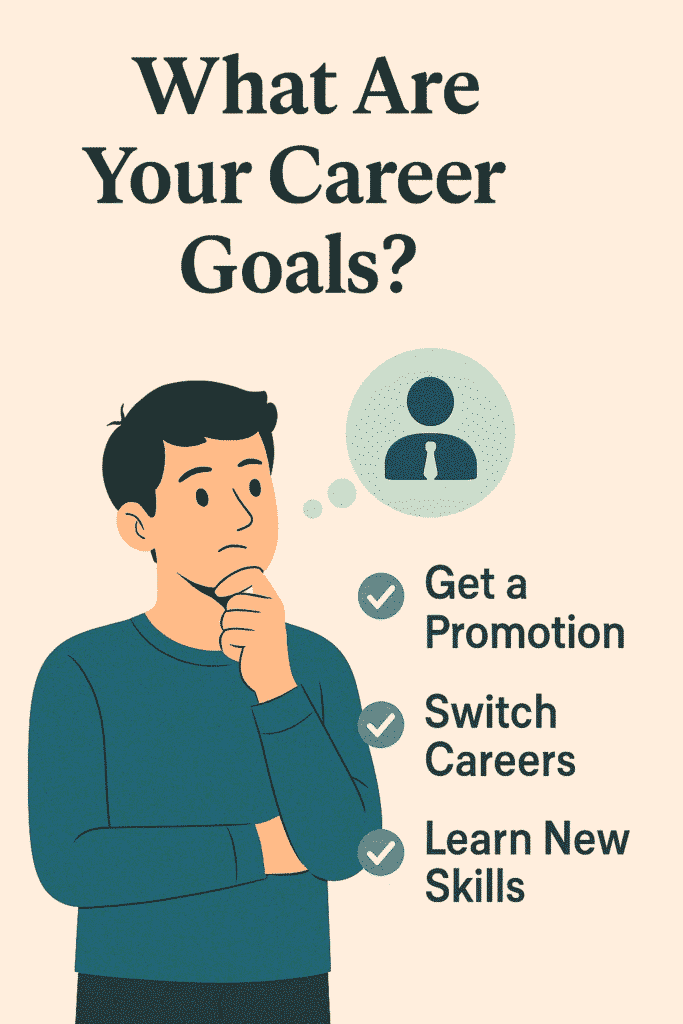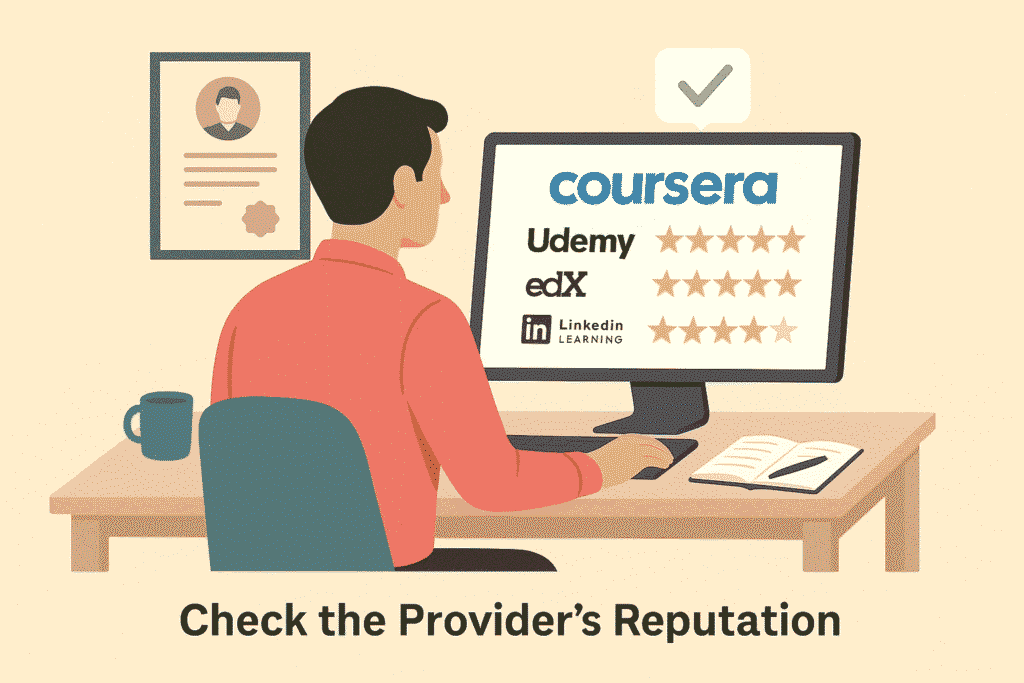
In today’s fast-changing world — especially when it comes to jobs — I’ve realized that continuous learning isn’t optional anymore, it’s essential. From my own experience, the moment you stop learning, you start falling behind.
Now, here’s the tricky part: with thousands of online courses at your fingertips, the real challenge isn’t finding one — it’s choosing the right one. I’ve made both good and bad decisions when it comes to online learning. Picking the wrong course can feel like wasted time and money (I’ve been there 😅). But choosing the right one? That can completely shift your career — opening doors to promotions, new job opportunities, or even an entirely different career path.
So, how do you avoid the traps and make a smart choice? Let me walk you through the exact steps I use when deciding whether a course is truly worth it.

1. Define Your Career Goals
Before enrolling in anything, I ask myself one simple question: Where do I want to be in the next 2–3 years?
If your goal is unclear, you’ll end up buying random courses that don’t add up to much. One mistake I see beginners make is chasing “trendy” courses just because everyone else is taking them. For example, I once bought a coding course because it was on sale, even though coding wasn’t part of my career plan — and guess what? I dropped it halfway through.
If you want a promotion in your current role, choose a course that strengthens the skills you need for that promotion. If you’re planning a career switch, go for foundational courses in the new field.
2. Research What Employers Actually Want
This is one step many learners skip — and it costs them. From my experience, before investing in a course, I jump on LinkedIn or job portals and search for the role I want. Then I note down the top 5–10 skills employers keep asking for.
For example:
- Social media managers almost always need Meta Ads, Canva, and Google Analytics.
- Data analysts need SQL, Python, and Excel.
I learned this the hard way. I once took a very general “business analytics” course, but when I looked at job descriptions later, I realized I really needed SQL. That mistake set me back a few months. Lesson learned: always match courses with industry demand.

3. Check the Provider’s Reputation
Here’s something I’ve learned the hard way: not all online courses are created equal. Some certificates can actually boost your CV and get a recruiter’s attention, while others barely get a second glance.
My personal rule of thumb is pretty simple:
- If it’s from a trusted global platform like Coursera, Udemy, edX, or LinkedIn Learning — that’s usually a safe bet.
- If the instructor is a real industry professional who has actually worked in the field (not just someone repeating theory), that’s even better.
- And if the course has hundreds of positive reviews from learners who completed it, that’s a big green flag for me.
For example, when I added a Google Project Management Certificate from Coursera to my LinkedIn, recruiters noticed it almost immediately. But the time I added a random “Project Basics” course with no credible instructor? Honestly, it didn’t make any difference.
4. Look for Practical, Hands-On Content
I’ll be honest: theory alone doesn’t get you hired. Employers want to know you can apply knowledge.
That’s why I always check whether a course has:
- Assignments
- Case studies
- Real projects
- Peer or instructor feedback
When I first tried an SEO course, it was all definitions and theory — no practice. I finished it, but when I sat in an interview, I couldn’t explain how to actually run a campaign. Later, I retook a different SEO course that included keyword research, content writing, and even building a demo site — and that’s what made the difference.

5. Match the Course to Your Learning Style
This one’s personal, and it’s easy to ignore. I’ve realised I learn best with video lessons plus exercises. Some people prefer live classes, others like text-based PDFs.
For example, Udemy courses work for me because I can watch bite-sized videos anytime. But when I needed accountability, I joined a Coursera course with weekly deadlines and peer reviews. That structure pushed me to finish.
Don’t underestimate this — the right format can make or break your motivation.
6. Balance Time Commitment with Career Outcomes
Another mistake I made early on was underestimating how much time a course required. Some look short but end up being 50+ hours. Others look long but are actually self-paced and manageable.
Ask yourself:
- Do I want a quick skill upgrade (few hours to a weekend)?
- Or am I ready for a career-changing commitment (3–6 months)?
For example, when I just needed to sharpen my Excel formulas, a 6-hour Udemy course did the job. But when I wanted to get into digital marketing, I invested 3 months into a Coursera Professional Certificate.
7. Compare Cost vs. Value
Let’s be real — price matters. But don’t assume that higher cost = higher value.
I’ve taken $10 Udemy courses that were better than $200 ones. The key is whether the course gives you skills you can use.
Pro tip: Never pay full price on platforms like Udemy. Wait for sales or use coupons. On Coursera, check if financial aid is available. And of course, I personally recommend browsing bestcoursecoupon.com — I’ve saved hundreds of dollars finding deals there.
8. Make Sure the Certificate Adds Value
Here’s my honest opinion: not all certificates are worth displaying on LinkedIn.
The ones that matter most are from big brands or accredited institutions:
- Google, Microsoft, IBM, Meta (industry recognition)
- Universities (Harvard, Stanford, etc. via edX or Coursera)
Generic certificates from small providers may not impress recruiters. But they can still be useful for learning.
I once listed a Udemy certificate on my CV — nobody asked about it. But when I completed a Google Analytics certificate, recruiters noticed immediately.
9. Look for Career Support
This is an underrated factor. Some platforms go beyond teaching and actually help you land jobs.
Coursera and edX sometimes offer:
- Resume reviews
- Career coaching
- Job placement partnerships
Even if you don’t use them, having that extra support feels like a safety net.
10. Watch Out for Red Flags
I’ve been burned before by “shiny” courses that promised too much. Watch out for:
- “Get rich quick” claims
- Vague course descriptions with no syllabus
- Instructors with no credentials
- Outdated content (e.g., social media courses from 2018)
If it sounds too good to be true, it probably is
Final Thoughts
Choosing the right online course isn’t about jumping on the latest trend — it’s about being strategic. Ask yourself: Will this course move me closer to my career goal? If the answer is no, save your time and money.
From my own journey, I’ve learned that the right course can be a turning point. It gave me the skills to confidently apply for jobs I once thought were out of reach. And the wrong ones? Well, they taught me the importance of doing my homework before enrolling.
So take your time, research carefully, and invest in learning that pays you back.
And if budget is holding you back, don’t forget to explore our latest course coupons and discounts — a little saving goes a long way when you’re building your future.


